206 scholarly books by Arc Humanities Press and 29
start with M
206 scholarly books by Arc Humanities Press and 29
206 scholarly books by Arc Humanities Press
29 start with M start with M
29 start with M start with M
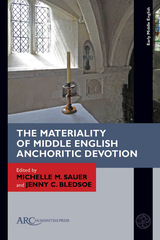
The Materiality of Middle English Anchoritic Devotion
Michelle M. Sauer
Arc Humanities Press, 2021
Anchorites and their texts, such as Ancrene Wisse, have recently undergone a reevaluation based on material circumstances, not just theological import. The articles here address a variety of anchoritic or anchoritic-adjacent texts, encompassing guidance literature, hagiographies, miracle narratives, medical discourse, and mystic prose, and spanning in date from the eighth through the fourteenth centuries. Exploring reclusion and materiality, the collection addresses a series of overlapping themes, including the importance of touch, the limits of religious authority, and the role of the senses. Objects, metaphorical and real, embodied and spiritual, populate the pages. These categories are permeable, with flexible and porous boundaries, demonstrating the conflation of ideas, concepts, and manifestations in medieval materiality. In fact, the permeability of these categories demonstrates how materiality can reshape our approach to medieval texts. It leaves room for directions for future study, including the application of material analysis to previously unstudied objects, spaces, and literary artifacts.
[more]
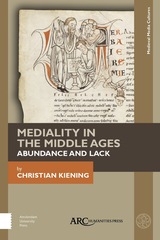
Mediality in the Middle Ages
Abundance and Lack
Christian Kiening
Arc Humanities Press, 2019
In medieval culture, media forms were placesof mediated immediacy. They transported apresence of the divine, but also knowledge ofits unattainability. This volume investigates the multi-layered and fascinatingapproaches of medieval authors to the wordand writing, the body and materiality, andtheir experimentation with the possibilitiesof media before the concept was invented.The book presents, for the first time, acoherent, tightly argued history of medievalmediality, which also casts a new light onmodern thinking about the medial.
[more]
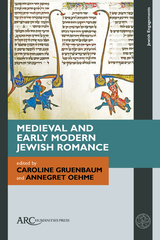
Medieval and Early Modern Jewish Romance
Caroline Gruenbaum
Arc Humanities Press, 2023
This study features essays from leading scholars highlighting the important Jewish contributions to the popular medieval genre of romance. Writing against strict notions of genre boundaries and canonization, this volume provides a new understanding of medieval and early modern romance through a working definition consisting of variable elements, including language, literary devices, plot, and characters. The contributions in this volume establish that many texts written in the medieval and early modern Jewish communities across Europe and beyond can be classified as "romance.” Each of the nine chapters as well as the afterword by Eli Yassif discusses romance as it relates to the medieval and early modern Jewish world, as well as the greater non-Jewish context. This volume places Jewish texts into the scholarly conversation as sources for forming a new understanding of the genre of romance across religious and cultural boundaries.
[more]
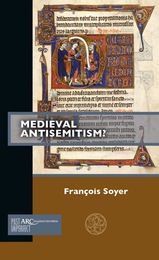
Medieval Antisemitism?
François Soyer
Arc Humanities Press, 2019
In this work, François Soyer examines the nature of medieval anti-Jewish sentiment and violence. Analysing developments in Europe between 1100 and 1500, he points to the tensions in medieval anti-Jewish thought amongst thinkers who hoped to convert Jews and blamed Talmudic scholarship for their obduracy and yet who also, conversely, often essentialized Judaism to the point that it transformed into the functional equivalent of the modern concept of race. He argues that we should not consider antisemitism as a monolithic concept but accept the existence of independent, historical meanings and thus of antisemitisms (plural), including "medieval antisemitism" as distinct from anti-Judaism.
[more]
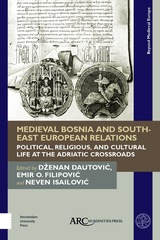
Medieval Bosnia and South-East European Relations
Political, Religious, and Cultural Life at the Adriatic Crossroads
Dženan Dautovic
Arc Humanities Press, 2019
<p >As a small, landlocked country, medieval Bosnia managed topreserve its individuality, characterized by religious plurality and by thepersistence of its own ancient customs. But its central position in the region,situated between east and west, and between Catholic and Orthodox Christianity,meant it was heavily influenced, both politically and culturally by theVenetian Republic, the Hungarian Kingdom, and the Byzantine Empire. Due to languageissues and scarcity of sources, this region has largely been overlooked bywestern historiography. This volume features contributions from an exciting newgeneration of medievalists, who are working to rectify this gap in thenarrative.</p>
[more]
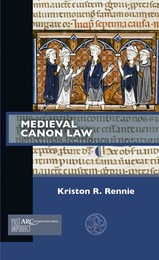
Medieval Canon Law
Kriston R. Rennie
Arc Humanities Press, 2018
<div>Canon law is an unavoidable theme for medieval historians. It intersects with every aspect of medieval life and society, and at one point or another, every medievalist works on the law. In this book, Kriston Rennie looks at the early medieval origins and development of canon law though a social history framework, with a view to making sense of a rich and complex legal system and culture, and an equally rich scholarly tradition.</div><div>It was in the early Middle Ages that the ancient traditions, norms, customs, and rationale of the Church were shaped into legislative procedure. The structures and rationale behind the law’s formulation – its fundamental purpose, reason for existence and proliferation, and methods of creation and collection – explain how the medieval Church and society was influenced and controlled. They also, as this short book argues, explain how it ultimately functioned.</div>
[more]
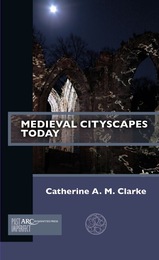
Medieval Cityscapes Today
Catherine A. M. Clarke
Arc Humanities Press, 2019
This book explores medieval cityscapes within the modern urban environment, using place as a catalyst to forge connections between past and present, and investigating timely questions concerning theoretical approaches to medieval urban heritage, as well as the presentation and interpretation of that heritage for public audiences. Written by a specialist in literary and cultural history with substantial experience of multi-disciplinary research into medieval towns, <i>Medieval Cityscapes Today</i> teases out stories and strata of meaning from the urban landscape, bringing techniques of close reading to the material fabric of the city, as well as textual artefacts associated with it.
[more]

Medieval France at War
A Military History of the French Monarchy, 885–1305
John France
Arc Humanities Press, 2022
This book provides an overarching, comprehensive analysis of the French military in the medieval period. The focus is on the armies of the French monarchy and the lands close around them, extending from the Low Countries to Provence. Central themes include recruitment and payment; military organisation; leadership, strategy, and tactics; weapons and arms; chivalry, military culture, and the rise of military professionalism.
[more]

Medieval History in the Modern Classroom
Using Project-Based Learning to Engage Today’s Learners
Lane J. Sobehrad
Arc Humanities Press, 2022
Teaching medieval history should engage students in the real work of professional medievalists. However, many undergraduate courses rely on instructional strategies that only engage students in rote retention of medieval "stuff" and unsupported writing assignments. With trends in the USA and elsewhere showing declining undergraduate enrollment in the humanities and an increasing number of questions from university administrators regarding the utility of the liberal arts, historians need to reassess how they teach. Project-based learning (PBL) is one approach that may help medieval history instructors offer coursework that is more engaging for today's undergraduate students and provide administrators a clearer picture of the utility of studying the past. The pedagogy of PBL actively engages students in projects reflective of the real work being done by medievalists, allowing instructors to move beyond the traditional narrative found in many undergraduate survey courses. This book provides an overview of PBL theory, methods for incorporating PBL into an undergraduate medieval history course, instructional strategies, scalable assessment formats, and other resources useful for any history classroom.
[more]
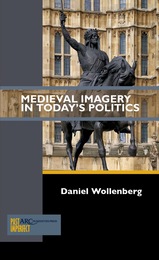
Medieval Imagery in Today's Politics
Daniel Wollenberg
Arc Humanities Press, 2018
The election of fringe political parties on the far and extreme right across Europe since spring 2014 has brought the political discourse of "old Europe" and "tradition" to the foreground. Writers and politicians on the right have called for the reclamation, rediscovery, and return of the spirit of national identities rooted in the medieval past. Though the "medieval" is often deployed as a stigmatic symbol of all that is retrograde, against modernity, and barbaric, the medieval is increasingly being sought as a bedrock of tradition, heritage, and identity. Both characterizations – the medieval as violent other and the medieval as vital foundation – are mined and studied in this book. It examines contemporary political uses of the Middle Ages to ask why the medieval continues to play such a prominent role in the political and historical imagination today.
[more]
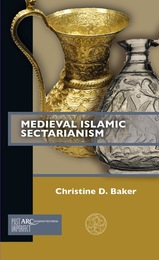
Medieval Islamic Sectarianism
Christine D. Baker
Arc Humanities Press, 2019
<div>This book asks readers to re-examine their view of the Islamic world and the development of sectarianism in the Middle East by shining a light on the complexity and diversity of early Islamic society. While Sunni Islam eventually became politically and numerically dominant, Sunni and Shiʿi identities took centuries to develop as independent communities. When modern discussions of sectarianism in the Middle East reduce these identities to a 1400-year war between Sunnis and Shiʿis, we create a false narrative.</div>
[more]
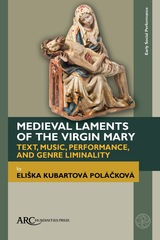
Medieval Laments of the Virgin Mary
Text, Music, Performance, and Genre Liminality
Eliška Kubartová Poláčková
Arc Humanities Press, 2023
Laments of the Virgin Mary represent a devotional genre that offered its clerical and lay audiences of the High and Late Middle Ages a deeply inspiring, yet at the same time ambiguous, religious experience. Through the deeply emotional and markedly animated representation of the Passion, seen as if through the eyes of the mother of God, audiences and performers were not only reminded of the redemptive power of the Cross, but encouraged to experience Christ’s sacrifice in a more personal and intimate manner. In the pious practice of imitatio Mariae, believers mirrored the sorrow of the mother through their own bodies in order to develop a kind of visceral empathy towards, and hence a deeper understanding of, the divine.
[more]

Medieval Perceptions of Magic, Science, and the Natural World
Carolina Escobar-Vargas
Arc Humanities Press, 2024
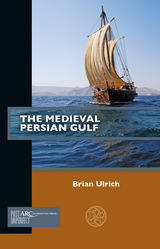
The Medieval Persian Gulf
Brian Ulrich
Arc Humanities Press, 2023
The Persian Gulf today is home to multiple cosmopolitan urban hubs of globalization. This did not start with the discovery of oil. This book tells of the Gulf from the rise of Islam until the coming of the Portuguese, when port cities such as Siraf, Sohar, and Hormuz were entrepots for trading pearls, horses, spices, and other products across much of Asia and eastern Africa. Indeed, products traded there became a key part of the material culture of medieval Islamic civilization, and the Gulf region itself was a crucial membrane between the Middle East and the world of the broader Indian Ocean. The book also highlights the long-term presence of communities of South Asian and African ancestry, as well as patterns of religious change among Jews, Christians, Zoroastrians, and Muslims that belie the image of a region long polarized between Arabs and Persians and Sunnis and Shi’ites.
[more]
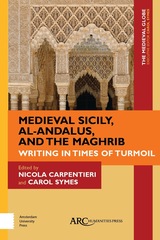
Medieval Sicily, al-Andalus, and the Maghrib
Writing in Times of Turmoil
Nicola Carpentieri
Arc Humanities Press, 2020
This book explores a millennium of literary exchanges among the peoples of the Maghrib, or westernmost strongholds of medieval Islam. In the seventh century, Muslim expansion into the western Mediterranean initiated a new phase in the layering of heterogeneous peoples and languages in this contact zone: Arabs and Berbers, Christians and Jews, Sunnī and Shīʿa Muslims, Greeks and Latins all helped shape identities, hybrid genealogies of knowledge, and political alliances. These essays excavate the literary artefacts produced in these times of turmoil, offering new perspectives on the intellectual networks and traditions that proved instrumental in overcoming the often traumatic transitions among political and/or religious regimes.
[more]
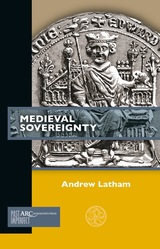
Medieval Sovereignty
Andrew Latham
Arc Humanities Press, 2022
Through a focused and systematic examination of medieval theologians, philosophers, and jurists, Andrew Latham explores how ideas about supreme political authority—sovereignty—first emerged during the high medieval period. The author provides a new model for understanding the concept of sovereignty, and traces its roots, not to the early modern or late medieval eras as do all other accounts, but to the High Middle Ages.
This book aims first to provide an account of a pivotal episode in the historical evolution of the idea of sovereignty—the supreme authority to command, legislate, and judge—in the thirteenth century. It also aims to reconnect early modern theorists of sovereignty to the medieval intellectual tradition out of which they emerged.
Latham traces the rise of a “dualist–regnalist” model whereby supreme authority was vested neither in the pope nor the emperor; nor was it divided between coordinate temporal and spiritual powers (kings and popes). Instead, it was vested exclusively in the king, who held it directly from God or (in the case of John of Paris, for example) “the people,” without any papal or imperial mediation.
[more]

Medieval Sovereignty
Andrew Latham
Arc Humanities Press, 2022
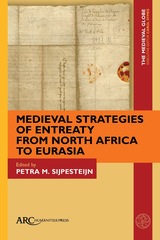
Medieval Strategies of Entreaty from North Africa to Eurasia
Petra Sijpesteijn
Arc Humanities Press, 2024
This volume in The Medieval Globe Books series surveys the distinctive but also shared rhetorical practices that characterize written requests for intercession, support, and patronage across many languages, cultures, and forms of interaction. Examples range from mundane requests to diplomatic negotiations, preserved in a variety of material media: potsherds, papyrus, paper, administrative handbooks, chronicles, and letter collections. Each contribution focuses on one textual sample or corpus of letters, providing new English translations as well as editions of the original texts in cases where no previous edition is available. Together, they represent the textual conventions and innovations of learned and vernacular epistolary traditions from many regions of North Africa and Eurasia, from the eighth to the fifteenth centuries CE.
[more]
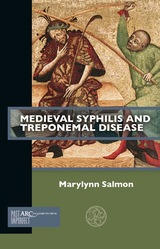
Medieval Syphilis and Treponemal Disease
Marylynn Salmon
Arc Humanities Press, 2022
Leaders in the field of paleopathology have found enough evidence to prove that treponematosis, including syphilis, existed in ancient and medieval Afro-Eurasia, settling a decades-long debate. Yet documentary and artistic evidence to support this important work remains scarce. After summarizing the confirmed cases of treponematosis detected to date, this book turns to contemporary accounts about the death of the English king, Edward IV, that strongly indicate syphilis as the cause. It then considers further evidence suggesting contemporary awareness that elites tended to experience the disease more severely than commoners, and includes numerous examples from medical treatises and artworks that are highly suggestive that both endemic and venereal treponematosis (bejel and syphilis) were present in late medieval Europe. In doing so, the author hopes to spark a conversation not only about the existence of the disease in various places and times, but also its wider impact on premodern society and culture.
[more]
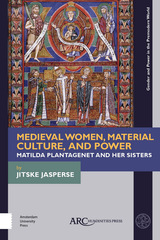
Medieval Women, Material Culture, and Power
Matilda Plantagenet and her Sisters
Jitske Jasperse
Arc Humanities Press, 2020
This book argues that the impressive range of belongings that can be connected to Duchess Matilda Plantagenet—textiles, illuminated manuscripts, coins, chronicles, charters, and literary texts—allows us to perceive elite women’s performance of power, even when they are largely absent from the official documentary record. It is especially through the visual record of material culture that we can hear female voices, allowing us to forge an alternative way toward rethinking assumptions about power for sparsely-documented elite women.
[more]
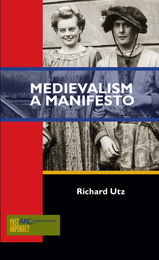
Medievalism
A Manifesto
Richard Utz
Arc Humanities Press, 2017
This book is called a manifesto because it has an unapologetically political objective. Richard Utz wants to help reform the way we think about and practise our academic engagement with medieval culture, and he uses his own observations as a medievalist and medievalism-ist over the last twenty-five years to offer ways in which we might reconnect with the general public that has allowed us to become, since the late nineteenth century, a rather exclusive clan of specialists who communicate mostly with each other.The traditional academic study of the Middle Ages, after more than a century of growing and plateauing, is now on the decline. While, at least over the next five to ten years, we will still be basking in the reassuring proximity (at conferences) of thousands of others who are involved in what we do ourselves, there is a manifest discrepancy between the large number of students who request that we address their love of Harry Potter, Lord of the Rings, Game of Thrones, and medieval-themed video and computer games, and the decreasing number of actual medievalists hired to replace retiring colleagues. We should pursue more lasting partnerships with so-called amateurs and enthusiasts for the sake of a sustainable future engagement with medieval culture. Richard Utz suggests some ways we might do this, and looks forward to “a more truly co-disciplinary, inclusive, democratic, and humanistic engagement with what we call, for better or worse, the Middle Ages”.
[more]

Medievalisms and Russia
The Contest for Imaginary Pasts
Eugene Smelyansky
Arc Humanities Press, 2024
This new monograph devoted to a detailed exploration of the ways in which the medieval past has been wielded to propagandic effect in Imperial, Soviet, and post-Soviet Russia.
From politicians’ speeches to popular culture, from Orthodox Christianity to neo-paganism, the medieval Russian past remains crucial in constructing national identity, mobilizing society during times of crisis, and providing alternative models of communal belonging. Frequent appeals to a medieval Slavic past, its heroes and myths, have provided—and continue to provide—a particularly powerful tool for animating imperialist and populist sentiments.
This study explores persuasive—and pervasive—recourse to tropes concerned with the Middle Ages in Imperial, Soviet, and post-Soviet Russia, seeking to explain why an often romanticized medieval past remains potent in Russian politics, society, and culture today.
[more]
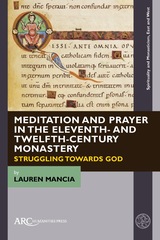
Meditation and Prayer in the Eleventh- and Twelfth-Century Monastery
Struggling towards God
Lauren Mancia
Arc Humanities Press, 2023
This book explores the dimensions of medieval monastic meditation, prayer, and contemplation in the heyday of Benedictine and Cistercian spiritual writing, the eleventh and twelfth centuries. Mancia aims to answer the following questions: What did extra-liturgical prayer and meditation look like for medieval monks and nuns in western medieval Europe? When, where, and how was it practised? Was there a set way to engage with monastic meditation, or were there a variety of medieval monastic meditative experiences in the eleventh and twelfth centuries? What did monks and nuns perceive as the limitations of monastic prayer and meditation, and how did they understand their own imperfections and failures to perform "perfect" devotion? What extra-textual tools—art, manuscripts, diagrams, spaces—did monks and nuns rely upon to stimulate their practices of meditation? What does monastic meditation reveal about the emotional lives of Benedictine and Cistercian monks and nuns in the high Middle Ages? And, finally, what does the monastic struggle to pursue a prayerful Christian life have to teach the secular world of the twenty-first century?
[more]
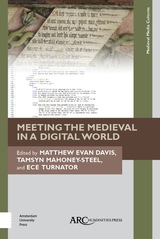
Meeting the Medieval in a Digital World
Matthew Evan Davis
Arc Humanities Press, 2018
This book looks at the intersection between medieval studies and digital humanities, confronting how medievalists negotiate the “virtual divide” between the cultural artefacts that they study and the digital means by which they address those artefacts. The essays come from medievalists who have created digital resources or applied digital tools and methodologies in their scholarship. Text encoding and analysis, data modeling and provenance, and 3D design are all discussed as they apply to western European medieval literature, history, art history, and architecture.
[more]
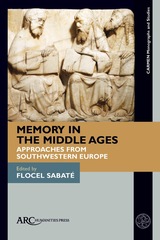
Memory in the Middle Ages
Approaches from Southwestern Europe
Flocel Sabaté
Arc Humanities Press, 2020
Memory was vital to the functioning of the medieval world. People in medieval societies shared an identity based on commonly held memories. Religions, rulers, and even cities and nations justified their existence and their status through stories that guaranteed their deep and unbroken historical roots.
The studies in this interdisciplinary collection explore how manifestations of memory can be used by historians as a prism through which to illuminate European medieval thought and value systems. The contributors draw the link between memory and medieval science, management of power, and remembrance of the dead ancestors through examples from southern Europe as a means of enriching and complicating our study of the Middle Ages; this is a region with a large amount of documentation but which to date has not been widely studied.
[more]
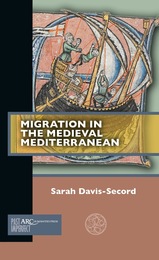
Migration in the Medieval Mediterranean
Sarah Davis-Secord
Arc Humanities Press, 2021
Migration in the Medieval Mediterranean argues that the cross-Mediterranean movement of peoples was a central aspect of the medieval world. Medieval people migrated in search of safety after regime change, secure life amongst coreligionists, and prosperous careers. This kind of travel between Muslim and Christian regions demonstrates the mutual influences, interconnections, and communications linking them, surpassing the differences between the two civilizations.
[more]
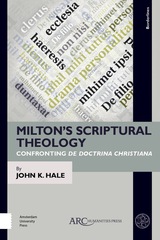
Milton’s Scriptural Theology
Confronting De Doctrina Christiana
John K. Hale
Arc Humanities Press, 2019
Milton spoke of <i>De Doctrina</i> as “my best and most precious possession.” Through close reading of the Latin itself, John K. Hale assesses the work and its aim, its degrees of success and its by-products, as these reveal Milton at his “personal best.” While to historians or methodologists of theology his best might not seem the very best ever, this work was unutterably precious to Milton, and close reading reveals the personal dimension of Milton’s theology and the passion and energy of his mind in its acts of thought.
[more]
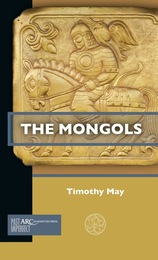
The Mongols
Timothy May
Arc Humanities Press, 2019
The Mongols emerged from obscurity to establish the largest contiguous empire in history. Although they are now no longer viewed as simply an unbridled force of destruction, it remains unclear as to how they succeeded in ruling a empire that stretched from the Sea of Japan to the Black Sea. This book investigates how the Mongol adopted and adapted different ruling strategies from previous Inner Asian empires as well as Chinese and Islamic Empires to rule an empire in which they were a distinct minority, and also investigates the processes by which this empire fragmented into an increasing number of states, many of which lasted into the seventeenth and eighteenth centuries.
[more]
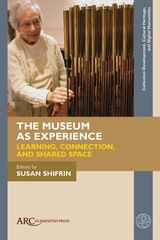
The Museum as Experience
Learning, Connection, and Shared Space
Susan Shifrin
Arc Humanities Press, 2024
Museums have long been viewed as exclusive, excluding, and as antiseptic to intimacy. In the past few decades, however, humanized experiences—cultivated by curators, educators, artists, activists, and marketers alike—have emerged as the reason for being for these cornerstones of community. Such experiences are often possible only in museum settings, where cultural exploration, probing conversation, and safe risk-taking can occur in spaces now becoming sacred through inclusiveness.
This book brings together an interdisciplinary collection of essays examining the kinds of human experiences and interactions that have converted the once-sterile museum into a space of enlivenment and enrichment, as well as physical and emotional well-being. The essays focus for the first time on the uniquely human and humanizing experiences to be found in the collections, programs, exhibitions, and spaces of today’s museums.
[more]
READERS
Browse our collection.
PUBLISHERS
See BiblioVault's publisher services.
STUDENT SERVICES
Files for college accessibility offices.
UChicago Accessibility Resources
home | accessibility | search | about | contact us
BiblioVault ® 2001 - 2024
The University of Chicago Press









